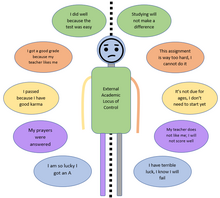
Back مركز الضبط Arabic Локус на контрола Bulgarian Locus de control Catalan Locus of control Czech Kontrollüberzeugung German Locus (psicología) Spanish کانون کنترل Persian Hallintakäsitys Finnish Lieu de maîtrise French מקור שליטה HE

Locus of control is the degree to which people believe that they, as opposed to external forces (beyond their influence), have control over the outcome of events in their lives. The concept was developed by Julian B. Rotter in 1954, and has since become an aspect of personality psychology. A person's "locus" (plural "loci", Latin for "place" or "location") is conceptualized as internal (a belief that one can control one's own life) or external (a belief that life is controlled by outside factors which the person cannot influence, or that chance or fate controls their lives).[1]
Individuals with a strong internal locus of control believe events in their life are primarily a result of their own actions: for example, when receiving exam results, people with an internal locus of control tend to praise or blame themselves and their abilities. People with a strong external locus of control tend to praise or blame external factors such as the teacher or the difficulty of the exam.[2]
Locus of control has generated much research in a variety of areas in psychology. The construct is applicable to such fields as educational psychology, health psychology, industrial and organizational psychology, and clinical psychology. Debate continues whether domain-specific or more global measures of locus of control will prove to be more useful in practical application. Careful distinctions should also be made between locus of control (a personality variable linked with generalized expectancies about the future) and attributional style (a concept concerning explanations for past outcomes), or between locus of control and concepts such as self-efficacy.
Locus of control is one of the four dimensions of core self-evaluations – one's fundamental appraisal of oneself – along with neuroticism, self-efficacy, and self-esteem.[3] The concept of core self-evaluations was first examined by Judge, Locke, and Durham (1997), and since has proven to have the ability to predict several work outcomes, specifically, job satisfaction and job performance.[4] In a follow-up study, Judge et al. (2002) argued that locus of control, neuroticism, self-efficacy, and self-esteem factors may have a common core.[5]
- ^ Rotter, Julian B (1966). "Generalized expectancies for internal versus external control of reinforcement". Psychological Monographs: General and Applied. 80 (1): 1–28. doi:10.1037/h0092976. PMID 5340840. S2CID 15355866.
- ^ Carlson, N.R., et al. (2007). Psychology: The Science of Behaviour - 4th Canadian ed.. Toronto, ON: Pearson Education Canada.[page needed]
- ^ Judge, T. A.; Locke, E. A.; Durham, C. C. (1997). "The dispositional causes of job satisfaction: A core evaluations approach". Research in Organizational Behavior. 19: 151–188.
- ^ Dormann, C.; Fay, D.; Zapf, D.; Frese, M. (2006). "A state-trait analysis of job satisfaction: On the effect of core self-evaluations". Applied Psychology: An International Review. 55 (1): 27–51. doi:10.1111/j.1464-0597.2006.00227.x.
- ^ Judge, Timothy A; Erez, Amir; Bono, Joyce E; Thoresen, Carl J (2002). "Are measures of self-esteem, neuroticism, locus of control, and generalized self-efficacy indicators of a common core construct?". Journal of Personality and Social Psychology. 83 (3): 693–710. doi:10.1037/0022-3514.83.3.693. PMID 12219863. S2CID 18551901.
© MMXXIII Rich X Search. We shall prevail. All rights reserved. Rich X Search